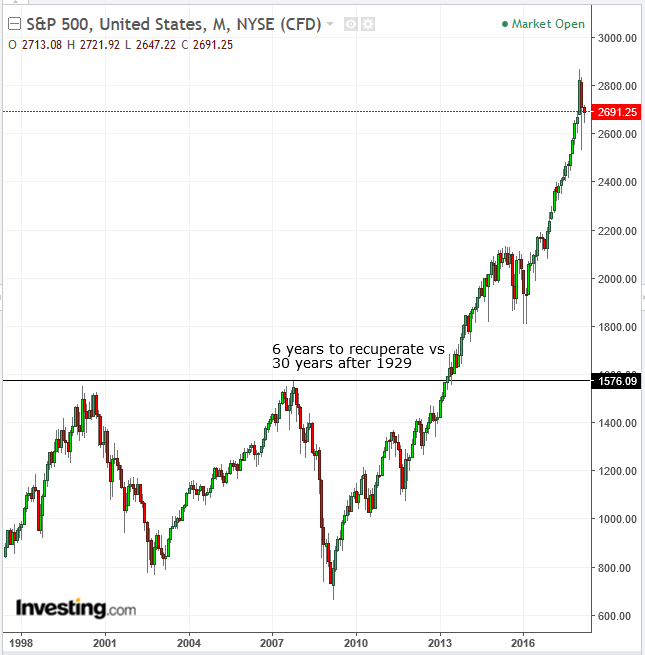Monthly stock overview: investors can't quite accept accommodation removal
US investors sell off equities on trade war fears, but most indices close higher on Friday
Global investors unconvinced by Friday’s US close, still fear trade wars
Euroskeptics reappear in Italian election; Brexit fears resurface
German coalition agreement appears to save euro, after initially failing to do so
The Chinese People’s Political Consultative Conference runs through March 15 and overlaps with the National People’s Congress meetings in Beijing, through March 20.
The Bank of Japan deputy governors’ confirmation hearings will be held Monday.
Reserve Bank of Australia monetary policy decision on Tuesday, with GDP data due Wednesday.
The ECB isn’t expected to change policy on Thursday, but its Governing Council may discuss a change to pave the way for the end of quantitative easing.
BOJ monetary policy decision and briefing on Friday.
The STOXX Europe 600 Index increased 0.4 percent, the first advance in a week.
The MSCI World Index of developed countries fell 0.1 percent on its fifth consecutive decline.
The MSCI Asia Pacific Index sank 1 percent with its fifth straight decline.
Japan’s Nikkei 225 Stock Average declined 0.7 percent to the lowest in more than 20 weeks.
The MSCI Emerging Markets Index fell 0.7 percent with its fifth consecutive decline.
The U.K.’s FTSE 100 gained 0.4 percent, the first advance in a week.
S&P 500 Futures decreased 0.4 percent.
The Dollar Index advanced less than 0.05 percent, losing an earlier 0.3 percent advance.
The euro increased 0.1 percent to $1.2326, the strongest in more than a week.
The British pound decreased less than 0.05 percent to $1.3796.
The Japanese yen gained 0.2 percent to 105.50 per dollar, the strongest in about 16 months.
The yield on US 10-year yield decreased three basis points to 2.84 percent.
Germany’s 10-year yield declined three basis points to 0.62 percent, the lowest in more than five weeks.
Britain’s 10-year yield fell three basis points to 1.474 percent, the lowest in more than five weeks.
WTI crude increased 0.9 percent to $61.78 a barrel, the largest climb in more than a week.
Gold advanced 0.3 percent to $1,326.60 an ounce, the highest in a week.
Key Events
Although most US stocks closed higher on Friday—except for mega-cap shares listed on the Dow Jones Industrial Average—all four major indices closed lower for the week.
Because of the Dow's inability to post gains on Friday, the index's decline nearly erased its two-week rebound after February’s inflation-scare selloff, an advance that had earned the Dow its best 1-week performance since 2013.
The January 29-February 8 equity selloff was prompted by a surge in Treasury yields, to a 4-year high. This market rotation not only attracted funds from stock investors, enticed by a high yield coupled with the added security of government bonds, but also underscored a general appetite for higher rates. Investors were selling current bonds to buy higher-yielding notes in anticipation of interest rate hikes.
Thanks to quantitative easing and near-zero interest rates, it took US equity markets “just” 4 years to recoup the losses they had incurred in the 2008 financial crash, which compares with 30 years of recovery after the 1929 crash. The Fed’s unprecedented accommodative monetary policy also helped stocks post a remarkable number of records last year.
Investors have always reacted with fear to higher interest rates. Higher borrowing costs would make it more difficult for them to sustain near-record high equity prices and historically high valuations; however, it also makes it harder for companies to invest in growth, which hurts their profits.
And it's only natural that investors should be even more guarded in the current policy backdrop. Ray Dalio, founding manager of Bridgewater Associates, the largest hedge fund worldwide, believes that higher interest rates will slow economic growth.
The 10 percent equity bounce from the low on February 9 to the high on February 27 (before closing lower) started with easing yields. But equities kept climbing even as Treasurys remained at a 4-year high, which highlighted that investors were shifting their narrative for a new reality: economic growth ultimately means that wealth is increasing and that wealth would be passed along to companies and their shareholders, even in the absence of the Fed's accommodative handout.
Then, last week, new Fed Chair Jerome Powell spoke. He said that he and his co-policy makers would have to reconsider their path to rate hikes after detecting a sudden strengthening of economic growth since December.
Investors had already made peace with the prospect of a higher-rate environment, but realized there and then that they were not prepared for a faster pace of tightening, and resumed the end-of January, early-February selloff.
Which brings us full-circle to Friday, when a brand new threat sent storm clouds hovering over equity markets: the fear of a trade war. Stocks opened lower after President Donald Trump returned to his protectionist rhetoric.
However, investors switched the narrative once again, this time convincing themselves that Trump's rhetoric wouldn’t have a lasting effect on stock prices. The new narrative said either there wouldn’t be follow-through, or it wouldn’t have the adverse effect it was initially believed it would have.
Hence, US stocks closed higher across the S&P 500, the NASDAQ Composite and the Russell 2000.
Global Financial Affairs
This morning, the market narrative is once again driving fears of a trade war. Asian stocks mostly lost ground, with the MSCI Asia Pacific Index slipping 1 percent to clinch its fifth straight decline. Japanese shares listed on the Nikkei 225 dropped 0.7 percent, hitting a 20-week low. Chines shares listed on Hong Kong’s Hang Seng fell the most in three weeks, by 2.28 percent. However, China's mainland index, the Shanghai Composite, bucked the trend, eking out a 0.07 percent gain, as China kept its 2018 growth target of 6.5 percent.
European stocks listed on the STOXX Europe 600 managed to squeeze out a gain after four days of losses, driven more by a weak euro than by stock bullishness.
In Italy, the anti-establishment Five Star Movement turned out to be the big winner of Sunday’s political election, as it bagged the support of around a third of the electorate. While not enough to form a government on its own, it scored one more victory in its rise to power. The Five Star Movement and the anti-migrant League could reach a majority in at least one of the two houses, should they join forces.
Even the coalition deal that was finally sealed in Germany didn’t seem to be enough to support the euro, initially. Trump’s threat of hefty steel and aluminum tariffs may have weighed on the single currency. Later, however, the euro rebounded. With no other known reason, it looks like it was the German deal that saved the day for the euro.
This increases the risk—which was heightened by the Brexit vote, and for which the EU has been so resentful to Britain—of a further unraveling of the EU, and potentially its single currency. While the euro was sold off in FX markets, its reduced value heralds higher sales for European exporters, and makes euro-denominated assets, including shares, cheaper for foreign investors.
Investor focus is now likely to turn to the Bank of Japan and the European Central Bank, which are holding interest rate policy meetings, and to China's National People Party Congress. Still, we expected that the most colorful political figure, the US's Trump, will dominate the market limelight with his proposed trade tariffs.
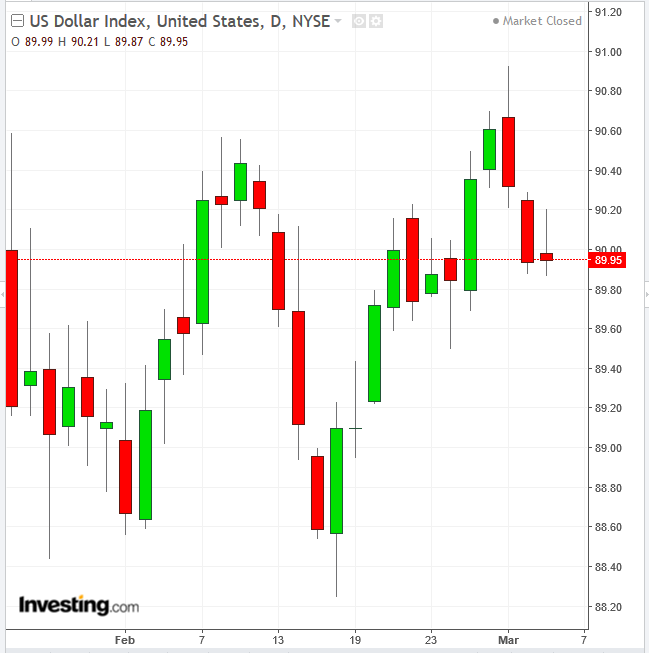
A rotation out of stocks and into the safety of Treasurys boosted the dollar, already stronger on the weakening euro, its biggest trading currency.
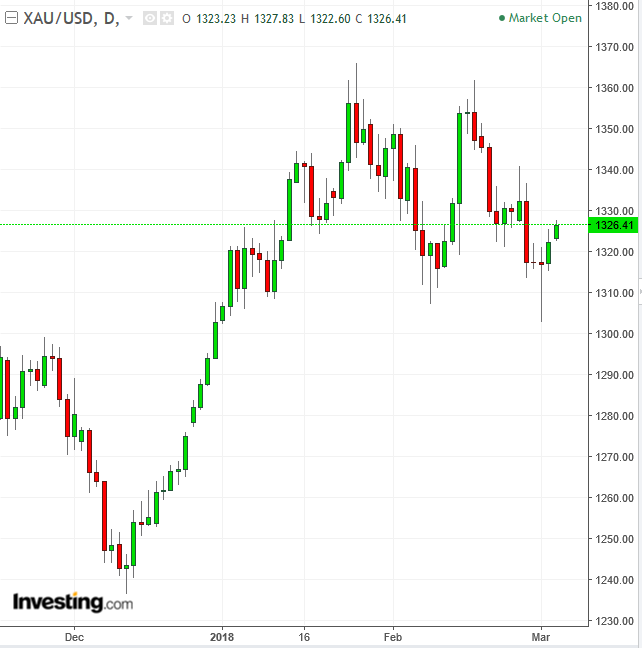
Gold held on despite an earlier dollar rise, perhaps a result of its safe haven status during a global equity selloff. Technically, the yellow metal is eyeing the top of its range.
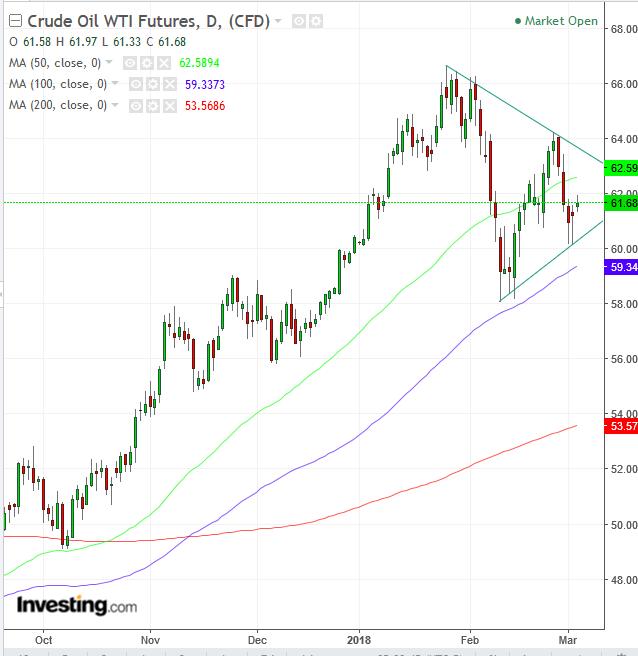
WTI crude climbed as geopolitical risk resurfaced, with a halt at Libya’s biggest crude field sparking speculation that supply will tighten and help reduce a global glut.
Technically, the price has been consolidating since January 25, in a Symmetrical Triangle, which demonstrates that both supply and demand are motivated to strengthen their positions. While the price crossed below the 50 dma (green) for a second time since consolidating, the 100 dma (blue) hovers below the pattern in a sign of support.
Although, the demand is presumed to overcome supply per the prevailing trend, only a decisive upside breakout will signal that. Till then, a downside breakout would generate just as strong a signal, to the downside.
Bitcoin advanced for a third day.
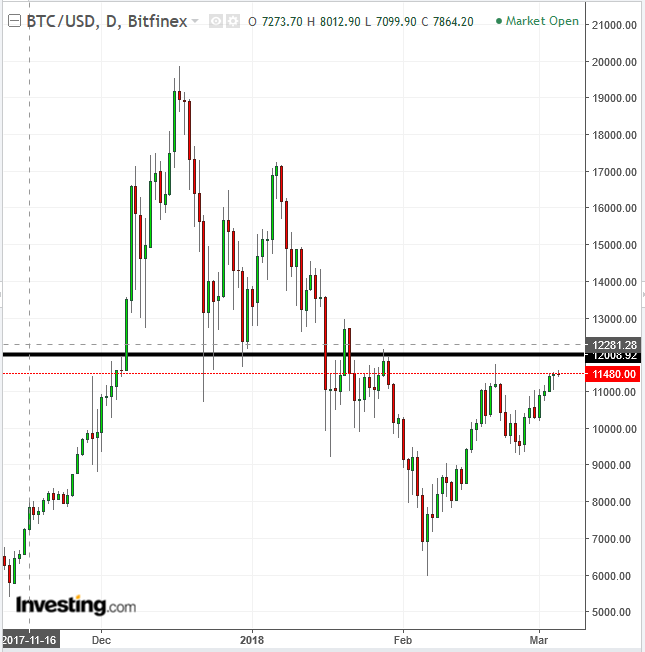
The most popular cryptocurrency is still squeezed between supply and demand at a key-level, beneath $12,000. Yesterday, the price formed a Hanging-Man, potentially confirming the resistance of the Shooting Star formed on February 20. A close beneath the Hanging Man’s real body would confirm its bearish implication. A penetration of its $11,776 high would register a higher peak, officially completing a reversal from a downtrend since January 16, to an uptrend.
Up Ahead
Market Moves
Stocks
Currencies
Bonds
Commodities

